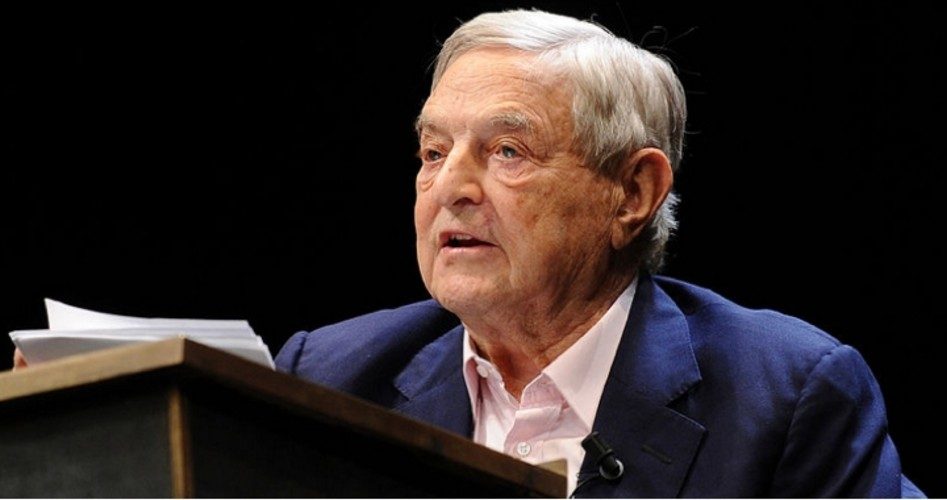
What does billionaire leftist George Soros fear? Not the hundreds of thousands of Middle Eastern refugees pouring into Europe and the possibility that included within could be hundreds or maybe thousands of terrorists. He expresses no worry about the cultural problems or security concerns that Middle Eastern immigrants have already brought to the European continent.
No, Soros fears the “real threat” of collapse of the Schengen system, in which the 26 European Union member nations have abolished any real border control at their internal borders — leading ultimately to the collapse of the European Union itself. Certainly the threat of Great Britain leaving the EU could be just the first, followed by other nations that could leave the super-national EU behind. In Britain, as in many other nations, the open-borders policy imposed upon member nations by the EU is a major reason for the possible break-up.
The pointed criticism of Hungarian Prime Minister Viktor Orban by Soros (himself Hungarian-born) for his management of the European migrant crisis in 2015 sums up his feelings: “His plan,” said Soros of Orban, “treats the protection of national borders as the objective and the refugees as an obstacle. Our plan treats the protection of refugees as the objective and national borders as the obstacle.”
Certainly Soros does not see the infusion of hundreds of thousands of Middle Eastern refugees into Europe as a problem. On the contrary, he wrote an essay for the New York Review of Books in which he called for a solution that will require the people of the EU to cough up the money to handle the crisis. In his essay, Soros argued, “EU leaders need to embrace the idea that effectively addressing the crisis will require surge funding, rather than scraping together insufficient funds year after year. Spending a large amount at the outset would allow the EU to respond more effectively to some of the most dangerous consequences of the refugee crisis.”
How much will Soros’ plan of resettlement in European countries for 300,000 to 500,000 refugees per year cost? He estimates that the cost will be at least €30 billion (about $34 billion) each year.
“Thirty billion might sound like an enormous sum, but it is not when viewed in proper perspective,” Soros claimed, dismissing any concerns about the cost. “First we must recognize that a failure to provide the necessary funds would cost the EU even more. There is a real threat that the refugee crisis could cause the collapse of Europe’s Schengen system of open internal borders among 26 European states.”
How will this be financed? “Throughout history,” Soros explained, “governments have issued bonds in response to national emergencies. That is the case in Europe today. When should the triple-A credit of the EU be mobilized if not at a moment when the European Union is in mortal danger?” To pay off this debt, Soros suggested an increase in the Value Added Tax.
Soros has had a strong interest in the creation of a European “super-state,” dating back to his relocation to New York City in 1956, where he worked as an arbitrage trader for F.M. Mayer until 1959. His specialty was European stocks, popular in the United States with investors because of the formation of the European Coal and Steel Community, which evolved into the European Common Market, and finally, the European Union.
This bluntness of Soros in his essay for the New York Review of Books is instructive for Americans as we consider so-called free trade agreements. Despite the “free market”-sounding description given to these deals, they are actually multilateral managed trade agreements, requiring a multilateral and super-national governmental structure to regulate.
Many Americans sometimes “get lost in the weeds” of the details of these alphabet agreements (TPP, NAFTA, WTO), but they are extremely dangerous to American national sovereignty. As can be inferred from Soros’ comments, the link between international multilateral trade agreements and open borders is certain. Those Americans concerned about open borders for our country should understand that the ultimate goal of the advocates of these managed trade deals is the elimination of our nation’s borders with Mexico and Canada. That is one major reason that President Obama will not guard our borders — he sees them being erased anyway.
These government-managed trade deals lead ultimately to behemoths such as the EU, which regularly dictates internal social policies to its member states. Those Americans who resent the imposition of radical social agendas upon the states by our own federal government should know that any super-national state such as a North American Union could only be worse.
Soros is certainly no free market advocate. He blamed the financial crisis of 2007-09 on “market fundamentalism,” which he defined as the idea that “markets will correct themselves with no need for government intervention in financial affairs.”
Even liberal economist Paul Krugman has been critical of Soros. In 1999, Krugman stated, “Nobody who has read a business magazine in the last few years can be unaware that these days there really are investors who not only move money in anticipation of a currency crisis, but actually do their best to trigger that crisis for fun and profit.” He named George Soros as a prime example of that type of investor.
Although Democratic Party presidential hopeful Hillary Clinton regularly denounces Wall Street, she voices no such criticism of Soros. No wonder. Soros has been a huge contributor to Clinton’s presidential campaign, even chairing her Super PAC’s national finance committee. So far, he has dumped over $7 million into her presidential coffers.
Hopefully, Americans will learn the lessons of the European Union and avoid any such super-national structure over our own country. And, we can hope that Soros’ fears come true, and that the authoritarian European Union will collapse.
Photo of George Soros: Niccolò Caranti
Steve Byas is a professor of history at Hillsdale Free Will Baptist College (soon to be Randall University) in Moore, Oklahoma.


